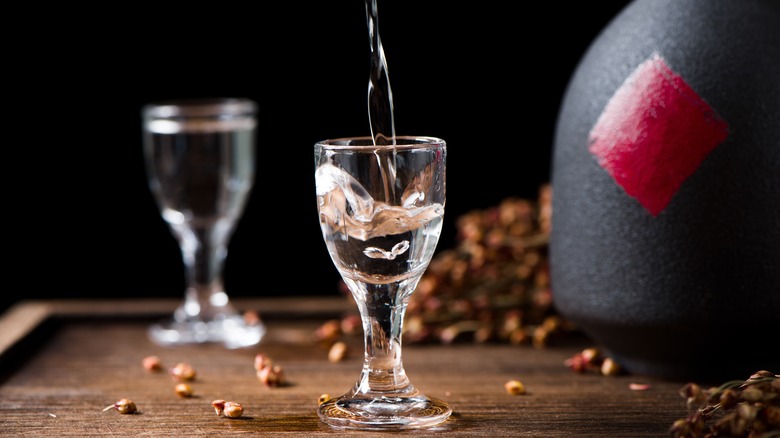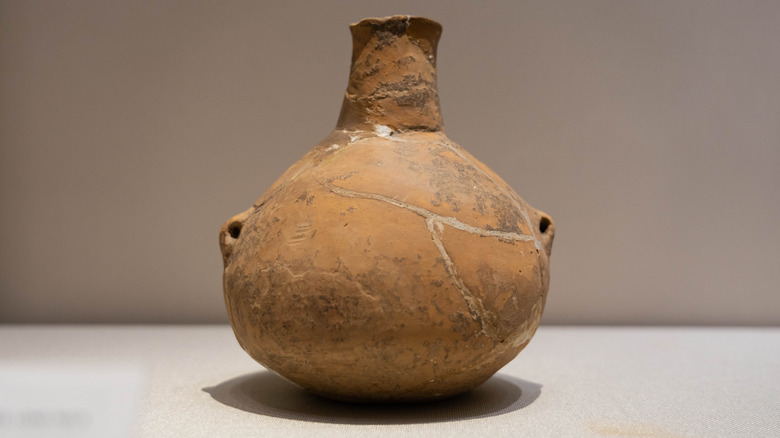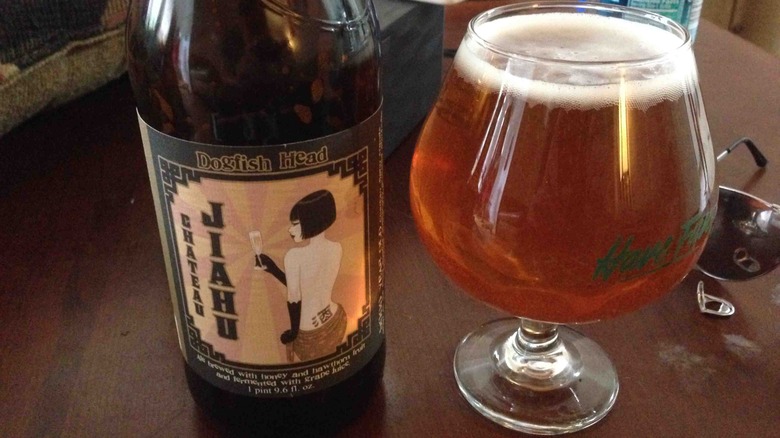The First Type Of Alcohol Ever Made Had A Unique Combination Of Ingredients
When people talk about ancient inventions, "first" often means the first instance of something that we definitively know about. That seems to be the case with alcohol. As noted by Encyclopedia Britannica, the invention of booze is an unrecorded part of prehistory. Alcoholic drinks were probably discovered accidentally when some sugary food was mashed and left out in hot conditions, then yeast fermented it. When some brave soul tried the result, they would have found it altered their state of mind, and so eventually people started making it on purpose — even going so far as growing specific crops for use in alcohol production. Soon enough, it became an important part of social ceremonies in early human cultures.
When exactly did all this start? According to Thought Co., the fact that some animals are known to unintentionally consume fermented fruit suggests that even our most ancient ancestors might have done the same. Thus, some theorize this practice may date back 100,000 years or more. Others point to cave paintings that arguably depict alcohol consumption from around 30,000 B.C., calling that the demarcation point. Yet, in order to purposely create alcohol, people required containers where they could store ingredients while they fermented. Pottery seems to have first been developed in ancient China, 15,000 years ago, thus setting the stage for the first official alcohol ever made.
Rice, honey, and fruit
As far as we know, alcohol was first purposely made in the Yellow River Valley of ancient China. Specifically — per the Penn Museum — evidence of this development (dating to around 7,000 – 6,600 B.C.) has been found in the Stone Age village of Jiahu, located in what is now the Henan province of Northern China. In the ruins of this settlement, some of the earliest known examples of pottery have been uncovered and then inspected. Inside, researchers found fermented residue of rice and honey, as well as hawthorn fruit and/or wild grapes (even scientific tests are sometimes imprecise). This concoction was probably brewed via a traditional Chinese method that uses mold to kickstart fermentation.
The team responsible for this find believes early alcoholic beverages like this one sparked a culture of drinking that persisted into early Chinese dynasties such as the Shang and Western Zhou (via the Proceedings of the National Academy of Sciences). There, alcohol took on medical and religious importance. Given that ancient China is one of the cradles of civilization, this early instance of alcohol production at Jiahu suggests a fascinating link between booze and societal development.
It's just a shame people can no longer try this primordial brew... or can they?
Chateau Jiahu channels the past
It turns out, folks can indeed try this 9,000-year-old brew — or at least, an approximation of it! Dogfish Head Brewery is well known for its "ancient" ales. Per NPR, the brewery previously whipped up Midas Touch beer, based on alcoholic residue taken from pottery found in the 2,700-year-old tomb of King Midas. In '06, Dogfish Head took a look at Jiahu and decided to give that site's leftovers the same treatment. Thus, "Chateau Jiahu" was born. In this modern recreation, barley malt, hawthorn fruit, muscat grape juice, and orange blossom honey are fermented with sake yeast for a month and then bottled for future enjoyment. Dogfish Head recommends serving it in a snifter beer glass and pairing it alongside foods such as oranges or your favorite spice cake recipe.
Those looking to recapture the magic of the past might be a little disappointed by the differences between this version and the original. However, as Dogfish Head owner Sam Calagione told NPR, "Probably, all beer thousands of years ago — to our modern palates — would have tasted spoiled." Relative to today, the brews back then were crudely made, so their tastes and textures reflected that. Therefore, Dogfish Head chose to update its recipe just enough to make it appetizing while still feeling authentic.
While we can't pinpoint the exact date when alcohol was first consumed by humans, we can confidently say ancient China was instrumental in the history of alcohol. We can also say cheers to that!


